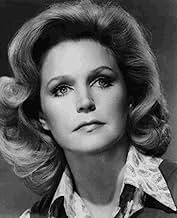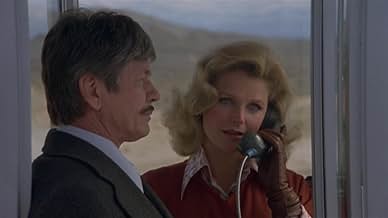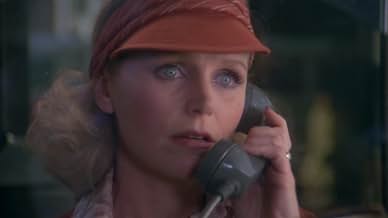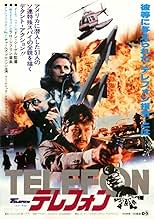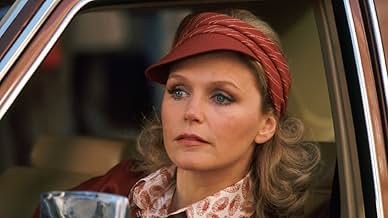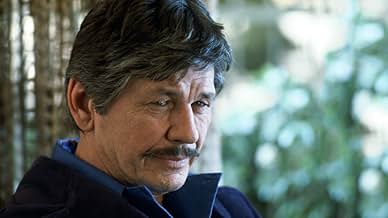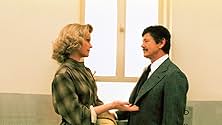AVALIAÇÃO DA IMDb
6,5/10
6,6 mil
SUA AVALIAÇÃO
Um oficial russo é enviado aos Estados Unidos para tentar impedir que agentes adormecidos ataquem sem pensar entidades governamentais ao ouvirem certas palavras em código.Um oficial russo é enviado aos Estados Unidos para tentar impedir que agentes adormecidos ataquem sem pensar entidades governamentais ao ouvirem certas palavras em código.Um oficial russo é enviado aos Estados Unidos para tentar impedir que agentes adormecidos ataquem sem pensar entidades governamentais ao ouvirem certas palavras em código.
- Direção
- Roteiristas
- Artistas
- Prêmios
- 1 indicação no total
Regis Cordic
- Doctor
- (as Regis J. Cordic)
Avaliações em destaque
If you look at the history of American Cold War films, you see they often, but not always reflect the current state of Western-Soviet relations. Many of the B-movies of the 1950's reflected the anti-communist paranoia that existed stateside; and that decades's Invasion of the Body Snatchers (also directed by Don Siegel) brilliantly parodied McCarthyism. Now we find ourselves in the late 1970's. Gone are Stalin and Kruschev - now we have Breznev and Nixon/Ford and Jimmy Carter and a gradual policy of rapprochement and cooling of tensions. In this film, neo-Stalinists are purged by the pro-Détente Soviet leadership. One such old guard agent, played by Donald Pleasance (who is always in fine form with these 'oily' character representations) decides to unleash an old Soviet conspiracy hatched by leaders in the 50's and unknown to most of the current Soviet brass. I am not going to rehash the entire plot, but let it suffice to say that we have a top Soviet Army General (played by Charles Bronson who mercifully does not even attempt a Russian accent) working together with American double agent Lee Remick, to battle forces more sinister than the current leadership of either the US or the USSR. This truly is the movie that best reflects the détente political philosophy in vogue at this time.
This time around, Bronson is a Russian major sent to the USA to eliminate a renegade Stalinist who is activating human time bombs. It's a kind of Manchurian Candidate times twelve. Bronson's double-agent assistant is Lee Remick.
The plot, though not hard to follow, is a bit intricate and involves the solution of several puzzles and a good deal of travel around the country, from Denver to Akron to Los Angeles to Cambridge (NM), to some dumpy bar in rural Texas with a rattlesnake in a cage. The series is designed to spell out the name of the villain, Dalchimsky, across a map of the USA. It's not worth going into enough detail to explain exactly what that means. But I must add that I thought it was pretty rotten of the director to actually blow that rattlesnake's head off for real, Crotalus atrox, a beautiful specimen. Where is PETA when you need them? And what do they have against snakes? Oh, sure, nobody would argue that rattlesnakes are as cuddly as French poodles or sea otters -- but, still.
Bronson is his usual self with his built-in swagger and mustache. He's a Russian major and his hair looks styled by Mister Kenneth or something. And he's completely incapable of projecting anxiety, let alone fear. Lee Remick was no longer a teenage baton twirler but she has the strangest, most appealing pair of pale blue eyes, surrounded by black circles, like Meg Ryan's. And she too has a curious rolling gait, like a sailor's. Neither Bronson nor Remich was ever a major star by Hollywood standards but they're both engaging and it's sad to think that they are now both history. I could never get with Donald Pleasance as an actor. He's probably a fine man and loves his dog, but his shining dome and pop eyes become banal in a hurry. Sheree North in her small part gives a good impression of being an exuberantly sexy no-nonsense woman.
The plot has its implausibilities. We kind of expect Bronson and Remick to wind up together somehow, and they do, but it comes out of nowhere. Bronson has heretofore done no more than smile at Remick, and that only once, when suddenly they get in the car and take off for a motel ten miles away.
A couple of fireballs for the young at mind, but no car chases, no slow motion deaths (except for that disenfranchised rattler), and only one shooting.
This is one of about two Bronson vehicles I look forward to seeing again. I'm not sure why. Schifrin's music is no more than adequate. The photography is interesting, all of its colors drawn from the red end of the spectrum, all beige, gray, orange, and scarlet. Anyone in blue looks like a tramp at a Kandinsky exhibit. Maybe I like the irony of a Russian major trying to save the USA from being blown up.
The plot, though not hard to follow, is a bit intricate and involves the solution of several puzzles and a good deal of travel around the country, from Denver to Akron to Los Angeles to Cambridge (NM), to some dumpy bar in rural Texas with a rattlesnake in a cage. The series is designed to spell out the name of the villain, Dalchimsky, across a map of the USA. It's not worth going into enough detail to explain exactly what that means. But I must add that I thought it was pretty rotten of the director to actually blow that rattlesnake's head off for real, Crotalus atrox, a beautiful specimen. Where is PETA when you need them? And what do they have against snakes? Oh, sure, nobody would argue that rattlesnakes are as cuddly as French poodles or sea otters -- but, still.
Bronson is his usual self with his built-in swagger and mustache. He's a Russian major and his hair looks styled by Mister Kenneth or something. And he's completely incapable of projecting anxiety, let alone fear. Lee Remick was no longer a teenage baton twirler but she has the strangest, most appealing pair of pale blue eyes, surrounded by black circles, like Meg Ryan's. And she too has a curious rolling gait, like a sailor's. Neither Bronson nor Remich was ever a major star by Hollywood standards but they're both engaging and it's sad to think that they are now both history. I could never get with Donald Pleasance as an actor. He's probably a fine man and loves his dog, but his shining dome and pop eyes become banal in a hurry. Sheree North in her small part gives a good impression of being an exuberantly sexy no-nonsense woman.
The plot has its implausibilities. We kind of expect Bronson and Remick to wind up together somehow, and they do, but it comes out of nowhere. Bronson has heretofore done no more than smile at Remick, and that only once, when suddenly they get in the car and take off for a motel ten miles away.
A couple of fireballs for the young at mind, but no car chases, no slow motion deaths (except for that disenfranchised rattler), and only one shooting.
This is one of about two Bronson vehicles I look forward to seeing again. I'm not sure why. Schifrin's music is no more than adequate. The photography is interesting, all of its colors drawn from the red end of the spectrum, all beige, gray, orange, and scarlet. Anyone in blue looks like a tramp at a Kandinsky exhibit. Maybe I like the irony of a Russian major trying to save the USA from being blown up.
I was never a big Charles Bronson fan. His movies usually followed the same predictable patterns of revenge and violence with Bronson usually coming off dry and stiff. His performances were usually always one note.
Of the few films of his I have enjoyed (see also "The Mechanic" and "Hard Times") from that era, "Telefon is a surprisingly gripping thriller even though the story is downright silly at times. Bronson plays (and doesn't even begin to resemble) a KGB agent out to track a killer who have been brainwashed. One call from this guy and the reciting of some lines from a Frost poem and that person is hypnotized into going out and committing an act of violence that resembles terrorism in many cases. Donald Pleasance convincingly plays the bad guy and that, I think, is what makes the movie work. Pleasance is credible in the role, thus we fear him and route for Bronson to catch him. Also on hand is Lee Remick as an American agent assigned to help Bronson but who also has a hidden agenda of her own.
Director Don Seigel handles the silly material in a straightforward manner never taking things too seriously. Bronson is less stiff then usual and the action scenes are well done. The ending is a bit abrupt but that is minor nit picking. It's a silly thriller I enjoyed and, if you are a Bronson fan, I am sure you will enjoy it too.
Of the few films of his I have enjoyed (see also "The Mechanic" and "Hard Times") from that era, "Telefon is a surprisingly gripping thriller even though the story is downright silly at times. Bronson plays (and doesn't even begin to resemble) a KGB agent out to track a killer who have been brainwashed. One call from this guy and the reciting of some lines from a Frost poem and that person is hypnotized into going out and committing an act of violence that resembles terrorism in many cases. Donald Pleasance convincingly plays the bad guy and that, I think, is what makes the movie work. Pleasance is credible in the role, thus we fear him and route for Bronson to catch him. Also on hand is Lee Remick as an American agent assigned to help Bronson but who also has a hidden agenda of her own.
Director Don Seigel handles the silly material in a straightforward manner never taking things too seriously. Bronson is less stiff then usual and the action scenes are well done. The ending is a bit abrupt but that is minor nit picking. It's a silly thriller I enjoyed and, if you are a Bronson fan, I am sure you will enjoy it too.
Telefon casts Charles Bronson as a KGB agent on assignment in America trying to stop Donald Pleasance from igniting World War III. Bronson is aided and abetted uneasily by CIA agent Lee Remick and the two of them get involved with each other as well as the mission at hand.
It's quite a mission they have, Pleasance is an old line Stalinist and he's noticed the new regime is slowly doing away with his kind. So he knows about this operation involving 51 Manchurian candidates who are Russian sleeper agents the way Laurence Harvey was in the Manchurian Candidate. With the proper phrase these people who are under hypnosis and just living regular humdrum lives get a signal to complete a mission involving sabotage of some military installation in their area. Pleasance has come to America to set these agents off.
It might have been a whole lot easier to just dial long distance once he was out of the Soviet Union, but apparently Pleasance is also getting a few jollies and really wants to see his handiwork. Bronson gets the list and follows Pleasance's trail hoping to head him off.
A nice cast of talented players pulls off and makes entertaining when you think about it, a really silly Cold War era story. Pleasance as usual pulls all the stops out as the villain and Bronson is his usual menacing self. His loyal legion of fans might like Telefon, I'm kind of partial to it myself, but I recognize it's illogicality.
It's quite a mission they have, Pleasance is an old line Stalinist and he's noticed the new regime is slowly doing away with his kind. So he knows about this operation involving 51 Manchurian candidates who are Russian sleeper agents the way Laurence Harvey was in the Manchurian Candidate. With the proper phrase these people who are under hypnosis and just living regular humdrum lives get a signal to complete a mission involving sabotage of some military installation in their area. Pleasance has come to America to set these agents off.
It might have been a whole lot easier to just dial long distance once he was out of the Soviet Union, but apparently Pleasance is also getting a few jollies and really wants to see his handiwork. Bronson gets the list and follows Pleasance's trail hoping to head him off.
A nice cast of talented players pulls off and makes entertaining when you think about it, a really silly Cold War era story. Pleasance as usual pulls all the stops out as the villain and Bronson is his usual menacing self. His loyal legion of fans might like Telefon, I'm kind of partial to it myself, but I recognize it's illogicality.
This excellent spy thriller directed by action master Don Siegel unfortunately has a drab, aloof title that causes many to skip it for a more exciting-sounding tag. Even Charles Bronson fans, and they are legion, often ignore this little gem for others of the genre. Not only a dilly of a suspense story filled with some of Hollywood's best actors at the time, "Telefon" also contains humor and many tongue-in-cheek lines. The Robert Frost poem, "Stopping by Woods on a Snowy Evening," utilized to trigger the drug-induced hypnotized Soviet agents to finish their mission becomes a pun for KGB agent Maj. Grigori Borzov (Bronson)when ready to give alluring Barbara (Lee Remick) a tumble in the hay. Borzov looks KGB agent Barbara lustfully in the eyes and emphatically affirms, "Miles to go before we sleep."
Though many consider the story fanciful, it is not as far fetched as some of the actual schemes concocted by overly zealous CIA and KGB officials during the Cold War, especially at the time of the eyeball to eyeball confrontation between the Soviets and the Americans during the days of U-2, the Bay of Pigs, and the Cuban Missile Crisis. The fifty KGB agents trained at the time of the U-2 Incident to replace recently deceased Americans with similar profiles, to take out key installation sites when receiving the oral code, lines from the Robert Frost poem, are put on what seems to be permanent hold until one KGB trainer goes berserk and reopens the can of worms over a decade later, when many of the installations have been closed, converted, or moved. Enter agents Borzov and his supposed helper, Barbara, to stop the madman, Nicolai Dalchimsky, played with his usual nefariousness by Donald Pleasence. Borzov uncovers a method to his madness and the fun begins. But what is to become of Borzov once Dalchimsky is removed? There's plenty of spills and thrills along the way with the seasoned actors given intelligent and often humorous lines by writer Peter Hyams whose script is based on the novel by Walter Wager.
Though no one in the cast falters, even in the bit parts, Tyne Daly steals the show as Dorothy Putterman (oh, how the name fits), a computer nerd in those glorious DOS days of old before the world heard of Bill Gates. Not only does Daly get some of the best lines in the movie, she delivers them with élan. She also reminds the viewer to be careful what is said to a computer, because they are very sensitive little fellers.
Though many consider the story fanciful, it is not as far fetched as some of the actual schemes concocted by overly zealous CIA and KGB officials during the Cold War, especially at the time of the eyeball to eyeball confrontation between the Soviets and the Americans during the days of U-2, the Bay of Pigs, and the Cuban Missile Crisis. The fifty KGB agents trained at the time of the U-2 Incident to replace recently deceased Americans with similar profiles, to take out key installation sites when receiving the oral code, lines from the Robert Frost poem, are put on what seems to be permanent hold until one KGB trainer goes berserk and reopens the can of worms over a decade later, when many of the installations have been closed, converted, or moved. Enter agents Borzov and his supposed helper, Barbara, to stop the madman, Nicolai Dalchimsky, played with his usual nefariousness by Donald Pleasence. Borzov uncovers a method to his madness and the fun begins. But what is to become of Borzov once Dalchimsky is removed? There's plenty of spills and thrills along the way with the seasoned actors given intelligent and often humorous lines by writer Peter Hyams whose script is based on the novel by Walter Wager.
Though no one in the cast falters, even in the bit parts, Tyne Daly steals the show as Dorothy Putterman (oh, how the name fits), a computer nerd in those glorious DOS days of old before the world heard of Bill Gates. Not only does Daly get some of the best lines in the movie, she delivers them with élan. She also reminds the viewer to be careful what is said to a computer, because they are very sensitive little fellers.
Você sabia?
- CuriosidadesDirector Don Siegel asked Charles Bronson to shave his trademark mustache off for this movie. Bronson replied, "No mustache, no Bronson." Siegel said in his book 'A Siegel Film: An Autobiography', "I felt that as much as Bronson wore a heavy mustache in Russia, it would help his disguise if he had no mustache when he arrives in Canada. However he didn't want to shave it off."
- Erros de gravaçãoAll of the KGB characters shown in uniform at the beginning of the film are "out of uniform." Although Borzov, Bronson's character, and the others are clearly meant to be in the KGB, the uniforms they wear are trimmed in red, the color of the regular Soviet Army, not the KGB. During the era of the film KGB uniforms were trimmed in Royal Blue. Also, the uniforms in the film lack the distinctive "Sword and Shield" patch worn by KGB officers on their jacket and coat sleeves.
- Citações
Nicolai Dalchimsky: The woods are lovely, dark, and deep, but I have promises to keep. And miles to go before I sleep, and miles to go before I sleep. Remember. Miles to go before I sleep.
- ConexõesFeatured in 42nd Street Forever, Volume 3: Exploitation Explosion (2008)
- Trilhas sonorasThe Yellow Rose of Texas
(uncredited)
Traditional American folk melody
Principais escolhas
Faça login para avaliar e ver a lista de recomendações personalizadas
- How long is Telefon?Fornecido pela Alexa
Detalhes
- Data de lançamento
- País de origem
- Idioma
- Também conhecido como
- Telefone
- Locações de filme
- Helsinque, Finlândia(Moscow, Leningrad, Russia, ten days)
- Empresa de produção
- Consulte mais créditos da empresa na IMDbPro
Bilheteria
- Orçamento
- US$ 7.000.000 (estimativa)
- Tempo de duração1 hora 42 minutos
- Mixagem de som
- Proporção
- 1.85 : 1
Contribua para esta página
Sugerir uma alteração ou adicionar conteúdo ausente



